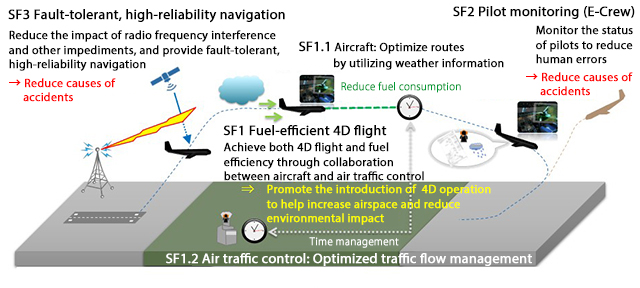Research & Development
JAXA promotes three research and development programs and a fundamental research program that underpins them.
Smart Flight Technology
Air traffic has been increasing at an annual rate of 4-5%. Should this growth rate continue, air traffic will double in 15 years. Under these circumstances, more airport capacity and airspace, reduction of environmental impact (CO2, noise, etc.), and measures to curb aircraft accidents are required. The Smart Flight Technology Research is JAXA’s effort to help boost the efficiency and safety of aircraft operation. This is achieved through integrated processing of various onboard and ground data, and automation and optimization of situation monitoring/option generation tasks of pilots and controllers. Specific research topics are as follows.
SF1: Research on fuel-efficient 4D flight technology
This research is aimed at achieving a balance between a time-constraint 4D flight (operating an aircraft so that it passes a waypoint at a designated time), which increases airspace throughput, and a less constraint fuel-optimized flight, which reduces environmental load. Currently, JAXA is approaching the issue from two perspectives. First, JAXA is developing algorithms for an onboard system which will propose an optimal route to the pilot based on weather information, and implementing the developed algorithm in a tablet device called an Electric Flight Bag (EFB). Second, JAXA is developing an air traffic control system algorithm for optimal air traffic flow management, for example designating the time at which an aircraft passes a waypoint, and determining the optimal departure time.
SF2: Research on pilot monitoring technology (E-Crew)
The safety of passenger aircraft operation is ensured by having two pilots who appropriately monitor each other’s conducts and the status of aircraft systems. To reduce pilot errors, which account for more than half of all aircraft accidents, and make maximum use of human abilities, JAXA will develop technology to automate this monitoring task. Ultimately, this technology will be applied as an assistance tool that gives pilots appropriate advice or a flight data analysis tool for safety management.
Related technology: Aviation human factors
SF3: Research on fault-tolerant, high-reliability navigation technology
Satellite navigation using global navigation satellite systems (GNSS), such as the United States’ Global Positioning System (GPS), is widely adopted for its convenience, and aircraft operations increasingly rely on GNSS. On the other hand, susceptibility to radio frequency interference, one of the vulnerabilities of GNSS, is becoming a real threat due to the rapid advance of digital radio technology seen in recent years. To address this threat, JAXA will develop technology to reduce the impact of radio frequency interference and other impediments by appropriately synthesizing GNSS signals received through multiple antenna elements, thereby increasing the reliability of navigation.

Smart Flight technology research topics

